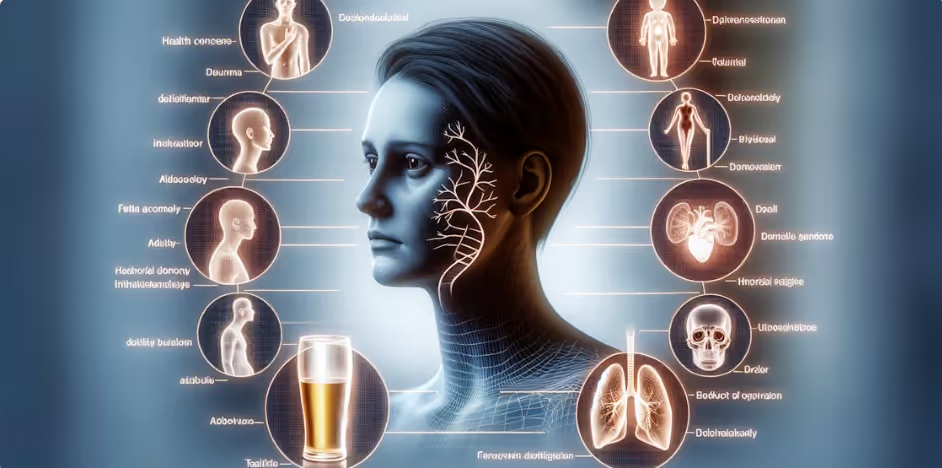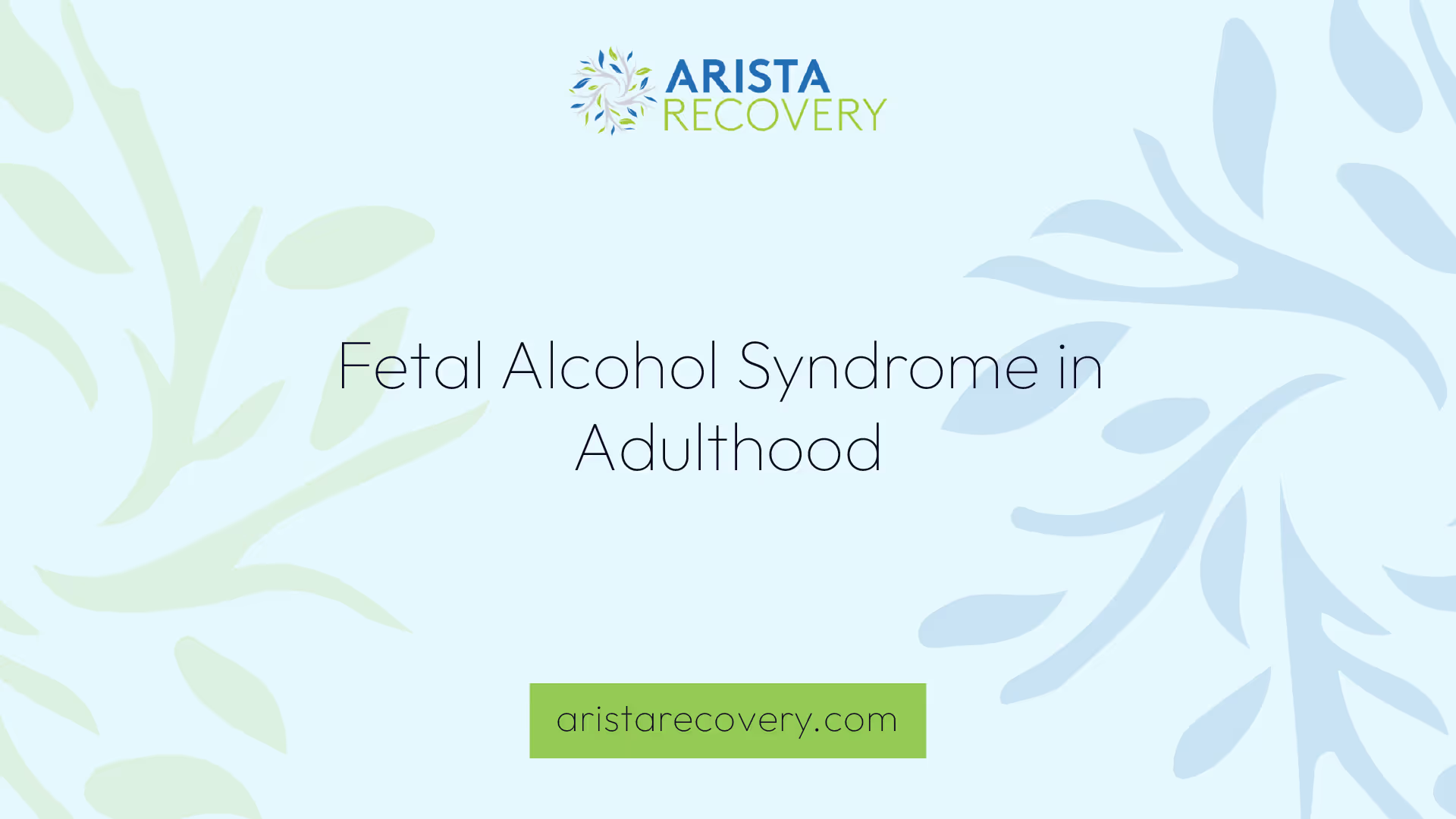Fetal Alcohol Syndrome in Adulthood

Understanding Fetal Alcohol Syndrome
Fetal alcohol syndrome (FAS) is a significant public health concern with implications that extend beyond childhood and into adulthood. This section provides an understanding of what FAS is, its prevalence, and the causes and impacts of prenatal alcohol exposure.

Definition and Prevalence
Fetal alcohol syndrome (FAS) is a leading preventable cause of developmental disabilities worldwide. It is characterized by lifelong physical, psychological, and cognitive impairments in newborns exposed prenatally to alcohol. FAS is a condition of varying combinations of specific birth defects and developmental disorders that affect the central nervous system and other brain functions, with the most severe cases leading to mental retardation and outbursts of violence. It is a result of maternal consumption of alcohol during pregnancy.
The impact of FAS extends into adulthood, affecting intellectual, physical, behavioral, and social development [4].
Fetal Alcohol Spectrum Disorders (FASD) is a broader category that encompasses various conditions related to prenatal alcohol exposure, such as Fetal Alcohol Syndrome (FAS), Alcohol Related Neurodevelopmental Disorder (ARND), Fetal Alcohol Effects (FAE), and Alcohol Related Birth Defects (ARBD). The estimated incidence of FAS is between 0.5 and 3 per 1,000 live births, while the estimated incidence of conditions within the FASD category is 10 per 1,000 live births [5].
Causes and Impact of Prenatal Alcohol Exposure
Fetal alcohol syndrome in adults is a direct result of prenatal alcohol exposure. When a pregnant woman consumes alcohol, it passes directly from the mother’s bloodstream through the placenta to the fetus. The developing fetus lacks the ability to process alcohol through the liver and other organs, resulting in high levels of blood alcohol concentration which can harm developing tissues and organs, particularly the brain.
The impact of prenatal alcohol exposure can lead to a wide range of physical and mental disabilities, including growth deficiencies, facial abnormalities, and central nervous system problems. The severity of these disabilities varies, with the most severe form being FAS. The effects of FAS are lifelong and can include learning disabilities, behavioral problems, and cognitive impairments. They can also lead to secondary conditions like mental health issues and problems with law or employment in adulthood.
Symptoms of FAS in Adults
Understanding the symptoms of fetal alcohol syndrome in adults is crucial for providing appropriate support and interventions. Adults with FAS often face cognitive and behavioral challenges as well as physical and emotional difficulties.
Cognitive and Behavioral Challenges
Adults with fetal alcohol syndrome may experience a range of cognitive and behavioral challenges due to the impact of prenatal alcohol exposure on the brain. These challenges often include issues with memory, attention, problem-solving, impulse control, judgment, and social interactions [6]. They may also struggle with abstract reasoning and understanding consequences.
These cognitive difficulties often impact daily life, creating hurdles in maintaining employment, managing money, and maintaining relationships. Furthermore, approximately 30% of adults with FAS experience legal trouble and are overrepresented in the criminal justice system compared to their non-affected peers.
Physical and Emotional Difficulties
In addition to cognitive and behavioral challenges, adults with FAS also face physical and emotional difficulties. They often struggle with emotional regulation and are at a higher risk of mental health conditions, including anxiety, depression, bipolar disorder, and schizophrenia, compared to the general population.
Adults affected by FAS are also more likely to struggle with substance abuse issues, which can exacerbate mental health problems and lead to further legal and social complications [7]. Furthermore, they are at an increased risk of unemployment, homelessness, and difficulties with independent living, which can result in a lower quality of life.
The challenges faced by adults with FAS highlight the importance of early intervention and support. Through appropriate interventions such as cognitive-behavioral therapy, occupational therapy, vocational training, social skills development, and mental health services, adults with FAS can address their specific needs and improve their quality of life [6]. Coping with fetal alcohol syndrome in adulthood can be challenging, but with the right support and resources, individuals can lead fulfilling lives.
Secondary Disabilities in Adults with FAS
In addition to the primary symptoms associated with fetal alcohol syndrome (FAS), adults with FAS are at increased risk for secondary disabilities. These can include a range of mental health issues and challenges related to legal matters and employment.
Mental Health Issues
Research indicates that adults with FAS struggle with higher rates of mental health conditions, including anxiety, depression, bipolar disorder, and schizophrenia, compared to the general population. These individuals may also experience challenges with memory, attention, problem-solving, impulse control, judgment, and social interactions due to the impact of alcohol exposure on the brain.
Moreover, adults affected by FAS are more likely to struggle with substance abuse issues, which can exacerbate mental health problems and lead to further legal and social complications.
Legal and Employment Challenges
The myriad of cognitive and behavioural challenges associated with FAS often translates into legal and employment difficulties. Approximately 30% of adults with FAS experience legal trouble and are overrepresented in the criminal justice system compared to their non-affected peers.
In terms of employment, adults with FAS often have a history of disrupted school experiences, which may result in limited educational achievement and employment opportunities. Impulse control issues, memory problems, and difficulties with problem-solving and emotional regulation can also present challenges in the workplace.
Consequently, adults with FAS are at an increased risk of unemployment, homelessness, and difficulties with independent living. They often require a range of services and supports, such as vocational training, mental health services, housing assistance, and substance abuse treatment, to address their complex needs effectively [4].
Understanding these secondary disabilities associated with fetal alcohol syndrome in adults is crucial for providing effective support and intervention strategies. By addressing these challenges, society can help individuals with FAS lead fulfilling and productive lives.
Diagnosis of FAS in Adulthood
Detecting fetal alcohol syndrome (FAS) in adults can be a complex and challenging process, due to the wide range of symptoms and the high variability in clinical presentation.
Challenges in Diagnosis
Early diagnosis and intervention are crucial for improved clinical outcomes in individuals with FAS. However, identifying individuals who do not meet the criteria for FAS but still have significant impairments (alcohol-related neurodevelopmental disorders - ARND) can be challenging [8].
These individuals often lack the characteristic facial features and growth retardation seen in FAS, making it difficult for clinicians to identify their condition. In addition, accessing a diagnosis for FASD can be challenging, as specialty clinics are few and far between. For instance, in New York state, there are only two specialty clinics, one in New York City and the other at the University of Rochester's FASD Diagnostic and Evaluation Clinic.
Advances in Diagnostic Techniques
Despite these challenges, significant strides have been made in the field of FASD diagnosis. Researchers are exploring the use of to improve the identification of alcohol-exposed pregnancies/infants. Promising biomarkers include fatty acid ethyl esters, ethyl glucuronide, ethyl sulphate, alcohol-derived phospholipid phosphatidylethanol, and microRNAs. These markers can indicate both prenatal alcohol exposure and its timing.
In addition to biomarkers, three-dimensional facial imaging and computer-based dense-surface modeling have been developed as a method to detect the effects of prenatal alcohol exposure. This approach has shown preliminary evidence of being able to identify at-risk individuals based on subtle, subclinical facial features.
Moreover, animal models have provided insights into the mechanisms by which alcohol affects facial development and the factors that may make a fetus more susceptible to these facial changes. The timing of alcohol exposure during pregnancy can produce different patterns of facial and brain malformations, contributing to the variability in outcomes observed in FASD.
These advances in diagnostic techniques are expected to improve the early detection and intervention of FAS, thereby enhancing the quality of life for individuals affected by this condition. However, more research is needed to further refine these techniques and ensure their widespread availability and accessibility.
Treatment and Support for Adults with FAS
Adults with fetal alcohol syndrome (FAS) face unique challenges and complexities that require specialized support and treatment. The focus should not only be on managing the symptoms but also on improving the overall quality of life and social adaptation of these individuals.
Importance of Early Intervention
Screening and early intervention programs are crucial for adults affected by FAS. Research suggests that early intervention can help in managing secondary disabilities and greatly improve the quality of life of these individuals [1].
Given that adults with FAS often have physical, mental, and social problems, and they are predisposed to develop psychiatric problems, difficulties in family relations, and other problems related to social adaptation and education, early intervention becomes all the more important.
Multidisciplinary Treatment Approaches
Treatment for adults with fetal alcohol syndrome typically involves a multidisciplinary team to address the various cognitive, emotional, and social difficulties that may arise. The treatment plan can include therapy, counseling, medication, and other interventions.
Adults with FAS may benefit from interventions such as cognitive-behavioral therapy, occupational therapy, vocational training, social skills development, and mental health services. These interventions are designed to cater to their specific needs and challenges.
Concerning cognitive and behavioral challenges, adults with FAS may exhibit issues with impulse control, memory, problem-solving, and emotional regulation. They may also struggle with abstract reasoning and understanding consequences. Therefore, interventions should be tailored to address these specific issues.
In conclusion, it's crucial to remember that while the challenges faced by adults with FAS are significant, with the right support, treatment, and early intervention, they can lead fulfilling lives. Society needs to play its part by fostering understanding, providing resources, and ensuring the availability of specialized care for this group of people.
The Societal Cost of FAS
Fetal Alcohol Syndrome (FAS) not only impacts the individual's life but also brings significant societal and economic implications. Understanding these costs can help highlight the importance of preventative measures and support services.
Economic Implications
The effects of FAS persist throughout the individuals' lives, and the costs to society are considerable due to the need for specialized services such as health care, education, rehabilitation, and judicial services [2]. FAS is associated with an increased risk of psychiatric disorders, criminality, unemployment, and homelessness in adulthood. As a result, individuals with FAS often require extensive support services and resources to meet their complex needs, significantly impacting economic outcomes for individuals and governments.
Need for Public Awareness and Support Services
Given the high prevalence and impact of FAS in the adult population, there is a pressing need for the development of comprehensive and integrated systems of care and support services tailored to meet the unique needs of individuals affected by prenatal alcohol exposure. Raising public awareness about the risks and consequences of prenatal alcohol exposure is critical in preventing FAS. Additionally, advocating for adequate support services can help to ensure that adults with FAS have access to the resources they need to navigate their daily lives and reach their full potential.
Support services may include, but are not limited to:
- Mental health services
- Vocational training and employment support
- Housing assistance
- Life skills training
In conclusion, the societal cost of FAS underscores the importance of prevention, early intervention, and ongoing support for individuals with FAS. By increasing awareness and providing adequate support, society can help to mitigate the impact of FAS on individuals and the community at large.
References
[1]: https://pubmed.ncbi.nlm.nih.gov/30383615/
[2]: https://pubmed.ncbi.nlm.nih.gov/16832326/
[3]: https://www.choosingtherapy.com/fetal-alcohol-syndrome-adults/
[4]: https://canfasd.ca/wp-content/uploads/publications/IssuePaper_CostFASD-Final.pdf
[5]: https://www.ncbi.nlm.nih.gov/pmc/articles/PMC2582751/
[6]: https://www.therecoveryvillage.com/alcohol-abuse/side-effects/fetal-alcohol-syndrome-affects-adulthood/
[7]: https://www.verywellmind.com/fetal-alcohol-syndrome-how-it-impacts-mental-health-7500760
[8]: https://www.ncbi.nlm.nih.gov/pmc/articles/PMC4476607/
[9]: https://www.rochester.edu/newscenter/fetal-alcohol-syndrome-fasd-survivors-thriving-499312/
You’re not alone in this.
When mental health challenges and addiction intersect, it can feel isolating. At Arista, we offer compassionate, evidence-based, and trauma-informed care to help you heal, grow, and move forward.
You’re not alone in this.
When mental health challenges and addiction intersect, it can feel isolating. At Arista, we offer compassionate, evidence-based, and trauma-informed care to help you heal, grow, and move forward.
Support that moves with you.
You’ve taken a brave first step. At Arista Recovery, we’re here to help you continue with best-in-class care designed for long-term healing and support.
.webp)






